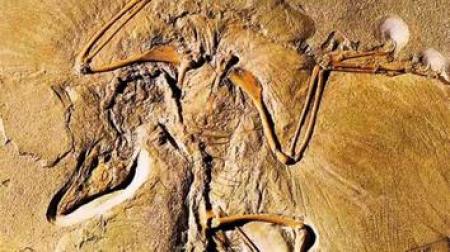The Missing Link Dinosaur: It's Just a Bird

A recent article from Live Science proclaimed, "Oldest Fossil of 'Missing Link' Dinosaur Discovered in Germany." Now, the actual find was not quite that sensational—no "missing link" involved. Actually, there wasn't even a dinosaur involved!
What they found was another fossilized Archaeopteryx specimen—a crow-sized bird with teeth and claws on its wings, as many now-extinct birds had (though penguins still have teeth and hoatzins have claws as juveniles). They found this fossil lower in the rocks than other specimens have been found. Because it's found in supposedly lower rocks (based on the "index fossil," in this case a type of sea creature called an ammonite, buried with it), they assume it's older. But, in a biblical view, this only means that this bird was buried before Flood sediments overwhelmed other members of its kind.
Archaeopteryx is clearly a bird, so scientists soon changed their tune and said it was the earliest known bird.
So why the sensational headline? The article notes Archaeopteryx was "once thought to be the feathery link between dinosaurs and modern birds." Key words: was once thought. The evolutionary story changes all the time because they have the wrong starting point of evolution and millions of years. Archaeopteryx is clearly a bird, so scientists soon changed their tune and said it was the earliest known bird. But, as the article notes, even that was overturned when they found other birds at the same evolutionary time period. But the author of the article calls these birds "bird-like dinosaurs" because of the supposed evolutionary connection between dinosaurs and birds (even though modern and now-extinct birds lived at the same time as the dinosaurs, including parrots, loons, owls, flamingos, and more).
But this new fossil, together with the other specimens they've collected, shows scientists something very interesting.
The specimens also show a great deal of diversity in their physical characteristics, which suggests that the fossils could represent more than one species. . . . "The high degree of variation in the teeth is particularly striking . . . [and] could reflect differences in diet."
One researcher claims this is "very reminiscent" of the Galapagos finches with diverse beaks that Charles Darwin studied during his voyage in the 1800s. Of course, contrary to what Darwin eventually taught and what this researcher believes, variation within a kind is not evolution. That's an interpretation imposed on the evidence. And it's an interpretation that goes against observational science, which has never been able to randomly create brand-new genetic information, as molecules-to-man evolution requires.
It's not surprising that, since creation, the Archaeopteryx kind speciated to fill several different environments (these environments were destroyed during the Flood, as was the whole surface of the planet). We can observe that birds (like the Galapagos finches) and all other creatures have been doing that since the Flood and into modern times. It's one of the survival mechanisms God has given each kind. It's neat to see an example of this potentially happening before the Flood.
The president, CEO, and founder of Answers in Genesis-US, the highly acclaimed Creation Museum, and the world-renowned Ark Encounter, Ken Ham is one of the most in-demand Christian speakers in North America.
First published at Ken Ham's Blog.





















